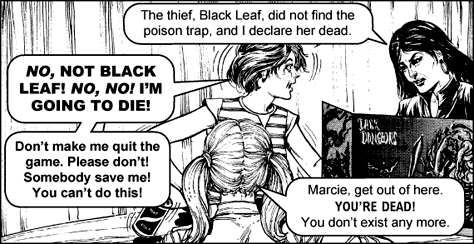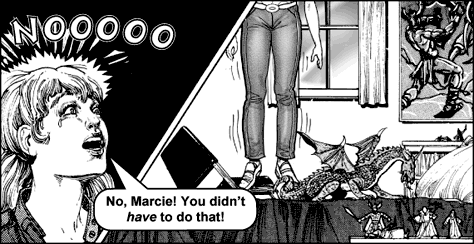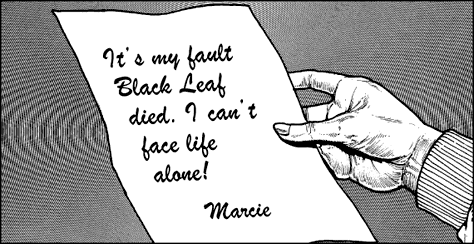Reading the new OGL.
As I said above, content more clearly associated with D&D (like the classes, spells, and monsters)
Can't be copyrighted as it is game mechanics. That falls under the public domain.
You'll see that OGL 1.2 lets us act when offensive or hurtful content is published using the covered D&D stuff.
So they're now claiming monopoly status. I wonder how the state attorney generals and the SEC feel about it.
We can't use the protective options in 1.2 if someone can just choose to publish harmful, discriminatory, or illegal content
Unenforceable since in the US there is the First Amendment which means that all speech that doesn't advocate criminal acts is protected speech. Using the US court system to go after third party creators for their expression of the first amendment rights is a monopoly and generally illegal.
We will continue to support VTT usage for both OGL creators and VTT operators.
I guess a lawyer told them that they can't copyright mathematical formulas and steal people's code that is copyrighted.
You own your content. You don't give Wizards any license-back, and for any ownership disputes, you can sue for breach of contract and money damages (versus holding up products other players are waiting for while we sort it out).
This is meaningless since they can't license out public domain items like game mechanics, spells, and monsters. This also means you can't sue them either for breach of contract as this is a non-enforceable contract.
No hateful content or conduct. If you include harmful, discriminatory, or illegal content (or engage in that conduct publicly), we can terminate your OGL 1.2 license to our content.
Unenforceable since this isn't an enforceable license due to them trying to control the copyright of public domain items. The license has no effect.
Now onto the actual OGL 1.2.
The core D&D mechanics, which are located at pages 56-104, 254-260, and 358-359 of this System Reference Document 5.1 (but not the examples used on those pages), are licensed to you under the Creative Commons Attribution 4.0 International (CC BY 4.0). This means that Wizards is not placing any limitations at all on how you use that content.
They can't claim copyright to public domain items like game mechanics. This is unenforceable. You're better off just rewriting the rules in your own words and tell Wizards to fuck right off.
Our copyright rights in the other content included in this System Reference Document are licensed to you under the Open Game License 1.2.
Again this is public domain stuff and they can't license it to you. It's the same as me renting your house to others.
Use of D&D content in virtual tabletops is allowed on the terms of Wizards’ Virtual Tabletop Policy.
Unenforceable due to the law of first sale with books. You can use them in any medium you wish since you physically own it. They can't allow you to use your toilet in your home as they don't own it.
Use of D&D content in streaming, fan art, cosplay, and other fan content is permitted as described in Wizards’ Fan Content Policy.
This is the poison pill. You're better off creating your own shit and telling Wizards to sit on it and rotate at 15,000 rpm.
CREATOR PRODUCT BADGES. For content published under the OGL 1.2, you may use one of following badges in the manner specified in the Creator Product Badge Style Guide. So long as you comply with that guide in using the badges, Wizards licenses you under the OGL 1.2 to use such a badge on any of Your Licensed Works.
Finally something that they can allow you to use which is their trademarks. This is the only thing that is legal in their entire OGL. If you want to use their trademarks then you have to comply with their demands. My response is to tell Wizards to fuck off and die.
You acknowledge that we and our licensees, as content creators ourselves, might independently come up with content similar to something you create. If you have a claim that we breached this provision, or that one of our licensees did in connection with content they licensed from us:
(a) Any such claim will be brought only as a lawsuit for breach of contract, and only for money damages. You expressly agree that money damages are an adequate remedy for such a breach, and that you will not seek or be entitled to injunctive relief.
(b) In any such lawsuit, you must show that we knowingly and intentionally copied your Licensed Work. Access and substantial similarity will not be enough to prove a breach of this Section 3.
This is them stating that they will steal from your copyrighted original work and you can't do shit about it.
WHAT WE OWN. We own Our Licensed Content and reserve all rights not expressly granted in this license.
They don't own the copyrights to game mechanics and monsters. To claim otherwise is copyright misuse.
YOU CONTROL YOUR CONTENT. You can make your Content available under any terms you choose but you may not change the terms under which we make Our Licensed Content available.
(a) You must clearly indicate that your Licensed Work contains Our Licensed Content under this license either by including the full text of this license in your Licensed Work or by applying the Creator Products badge in compliance with the then-current style guidelines.
(b) You may permit the use of your Content on any terms you want. However, if any license you offer to your Licensed Work is different from the terms of this license, you must include in the Licensed Work the attribution for Our Licensed Content found in the preamble to the applicable SRD, and make clear that Our Licensed Content included in your Licensed Work is made available on the terms of this license.
This is false as they have already stated that they can steal from your content and republish it with modifications. They also said that they own game mechanics in violation of many court cases and US law.
No Hateful Content or Conduct. You will not include content in Your Licensed Works that is harmful, discriminatory, illegal, obscene, or harassing, or engage in conduct that is harmful, discriminatory, illegal, obscene, or harassing. We have the sole right to decide what conduct or content is hateful, and you covenant that you will not contest any such determination via any suit or other legal action.
Another poison pill where you must abide by their political position at all times. They can force you out of their events etc... with this.
(b) Termination
(i) We may immediately terminate your license if you infringe any of our intellectual property; bring an action challenging our ownership of Our Licensed Content, trademarks, or patents; violate any law in relation to your activities under this license; or violate Section 6(f).
(ii) We may terminate your license if you breach any other term in this license, and do not cure that breach within 30 days of notice to you of the breach.
Point 1 is interesting because they are claiming to have copyrights to game mechanics and are classifying it as intellectual property. Yet, the US Copyright Office and the courts have ruled repeatedly that you can't copyright public domain items like game mechanics, spells, and monsters.
Severability. If any part of this license is held to be unenforceable or invalid for any reason, Wizards may declare the entire license void, either as between it and the party that obtained the ruling or in its entirety. Unless Wizards elects to do so, the balance of this license will be enforced as if that part which is unenforceable or invalid did not exist.
This is a fuck you I get out jail free card. Meaning that if someone challenges their claims of copyright over public domain items that they will remove the license to avoid going to court. This tells you that they know this license won't hold up to scrutiny by the US Copyright Office or the federal courts.
Governing Law/Jurisdiction/Class Action Waiver. This license and all matters relating to its interpretation and enforcement will be governed by the laws of the State of Washington, and any disputes arising out of or relating to this license will be resolved solely and exclusively through individual litigation in the state or federal courts located in the county in which Wizards (or any successor) has its headquarters, and the parties expressly consent to the jurisdiction of such courts. Each party hereto irrevocably waives the right to participate in any class, collective, or other joint action with respect to such a dispute.
They actually can't have a state court hear this since under the Constitution of the United States all states agreed that the US federal government handles trademarks, patents, and copyrights. The states do not have jurisdiction there. By mandating the case to be tried there will invoke a hardship for third party creators that live out of the state. I can readily see the US federal court in Seattle agreeing to move the case to a court that is local to the party being sued by Wizards as they have a financial burden imposed on them by a multi-billion dollar corporation.
Review by Counsel. You should seek advice of counsel to make sure you understand this license. You agree that you had the opportunity to do so.
This is the only smart part of the clause. Go to a copyright attorney and let them look this over to watch them laugh.
Now on to the VTT part.
So displaying static SRD content is just fine because it’s just like looking in a sourcebook. You can put the text of Magic Missile up in your VTT and use it to calculate and apply damage to your target. And automating Magic Missile’s damage to replace manually rolling and calculating is also fine. The VTT can apply Magic Missile’s 1d4+1 damage automatically to your target’s hit points. You do not have to manually calculate and track the damage.
Good they couldn't enforce copyright on code that does automation. It's far outside of what they can claim as it is copyrighted code and the mathematical formulas can't be copyrighted without making a monopoly.
What isn’t permitted are features that don’t replicate your dining room table storytelling. If you replace your imagination with an animation of the Magic Missile streaking across the board to strike your target, or your VTT integrates our content into an NFT, that’s not the tabletop experience. That’s more like a video game.
They can't do shit about animation of a magic missile that is created by a third party as Wizards does not own the copyrights to it. The creator of the automation does. The NFT bit is smart since it's the sale of jpgs of other people's content, but the NFT has no copyright associated with it. It's just binary on a spreadsheet saying that you own this without actually owning it via copyright.
We’ve never licensed visual depictions of our content under the OGL, just the text of the SRD. That hasn’t changed. You can create a creature called an Owlbear with the stat block from the SRD. You cannot copy any of our Owlbear depictions. But if you’ve drawn your own unique Owlbear, or someone else did, you can use it.
That's them admitting that they don't own the copyrights to game mechanics for a creature that's from folklore. You just can't use their artwork, which is copyrighted, for your games.
If you are a VTT owner or operator who supports OGL products on your platform, you have the same obligations for VTT content that any other website owner or operator has for copyrighted content under the DMCA.
Well to avoid this poison pill just don't support D&D as a VTT. Leave it to the community to handle it. Not like they can do anything about someone putting pdfs into say Tabletop Simulator and never putting them on the workshop. Your uploaded items are protected by Steam.
Well there's my take on this.



















